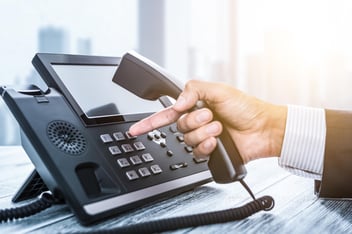Top 5 Tactics for Protecting Your VoIP Network
Just like with lots of other technological advancements in our world, your business’s VoIP network is subject to threats from hackers hoping to be involved in theft, fraud, and other crimes. An unlawful third party can access any system or device with a port and access to the internet.
![]()
This criminal action can cost you lots of money and time, and involve human resources to help pick up the pieces. Many of these hackers strive to access your network’s data and use your business phones for their verboten calls.
According to the Communications Fraud Control Association (CFCA), global fraud loss in telecom was approximately $28.3 billion in 2019 (the latest year the CFCA collected data). Given the overall rise in fraud and cybercrime since 2019, that figure has likely increased.
The lesson? We can’t afford to ignore the security of our communications systems. Below we have outlined the top tactics to safeguard your VoIP network and how to secure your network, router, phones, and your business to the best of your ability.
#1. Secure VoIP Phones with Strong Passwords
TeleSign surveyed 2,000 consumers in both the United States and the United Kingdom about their typical cybersecurity practices. 40% of respondents have been victims of some sort of cyberattack, including having an account hacked, a password stolen, or a notification that their credentials were compromised.
When you acquire VoIP solutions, they are often preconfigured with settings and passwords that can be visible to the public. Most phone web systems do not have automatic lockouts, so that hackers can hijack your interface with an infinite number of password attempts. That’s why it is up to you to create strong passwords to protect your network.
When purchasing new business phones or previously owned devices that have been set back to default, the first order of business should be changing passwords. It is better to do it right away than to put it off and forget to do it all together. Some systems utilize the same password for both the phone and web interfaces. Some have two different passwords. If they are indeed separate, do not use the same password for both.
It is recommended that you change passwords every six months to a year to stay protected continually. According to How To Geek, a strong password meets the following criteria:
- 12 characters minimum
- Incorporates numbers, symbols, capital letters, and lowercase letters
- Isn’t a dictionary word or combination of dictionary words
- Doesn’t rely on obvious substitutions (e.g., h0use for house)
It is also vital to update admin portal passwords for your VoIP service provider too. Hackers would love to gain access to that, too, and cause much damage. You can update device passwords too. Finally, never share your SIP security credentials with anyone.
#2. Create Security Layers
Businesses should plan their VoIP system as carefully as possible (just like their data network). Planning security in layers is one of the best ways to do this.
- Preventing intruders on your network should be the first layer of security. To secure your network, use VoIP-aware firewalls and close all ports during any sign of illicit activity (big or small).
- Your second layer of security should be phone authentication. This means that phones are not authorized to the network or IP PBX unless a mutual authentication exchange occurs.
- The third layer is authentication between the media and other channels. This involves media gateways, ALGs, firewalls, and other devices (including NAT devices).
- The final layer is user authentication. Only users authenticated by a specific user name, password, or device can access the network and make or receive phone calls.
An essential security aspect should have a good, secure firewall whenever someone on your network makes a phone call, SIP contacts, and creates a connection with the receiving device. Other entities take over carrying the call, but ultimately SIP is the one that terminates the call after you end it.
Even though there are a few vulnerabilities, SIP is critical for your VoIP network security. Also, it is important to regularly check for updates and update systems on all devices utilizing your network when available.
#3. Allow for Network Address Translation (NAT)
Network Address Translation (NAT) is a feature that routers provide for your VoIP phones, computers, or other devices your business uses. Your company has a private IP address that is only visible to your Local Area Network (LAN). This IP privacy feature works as a barricade for your business’s phone traffic and open internet traffic. Simply put, if a hacker isn’t able to find the private IP address of one of your devices, then they can’t interfere with your device from wherever they are.
VoIP systems that don’t utilize NAT are much more susceptible to attacks. Career hackers often use automated software programs that scan for access points to your network. VoIP phones that use a public IP address might receive “ghost calls” or calls that reach out to you just to determine what your device is. This is a popular exploration tactic hackers use to determine if a target is an easy one.
Having a private IP is so important when it comes to your network. It can be reassuring, at the very least. NAT adds more protection to your business by barricading your VoIP phone from hackers.
#4. Disable International Calling
Hackers have been known to actively seek the more expensive international phone numbers in hopes of receiving more data, information, and profit for themselves. They also will use your VoIP network to use calling minutes and rack up your bill. Some businesses, like smaller, local ones, tend not to need to make regular international calls. Disabling international calling is one way to protect yourself from potential hackers. If your business does have international calls regularly, then be sure to check your invoices regularly to make sure the calls being made are legitimate and that no malicious activity is detected. Another option if international calls are necessary is to enable pin codes for only those needing this functionality.
#5. Train Team Members
One security weakness regarding VoIP systems is that open access points can invite hackers unless users use the system responsibly. Anyone using your VoIP network needs to know how to handle passwords, when to update them, how to detect unusual network activity, and the best security measures to follow. These can be introduced in onboarding training with a section on cybersecurity and periodically refreshing staff on the importance of cybersecurity and preventive measures.
Hackers and scammers are known to strike during some of a business’s busiest times in hopes that their work will go unnoticed. If you aren’t already doing so, monitor your phone activity as often as possible or set up automated alerts when your usage is abnormally high.
Using these top 5 tactics detailed here is incredibly helpful in reducing your chance of a breach in your VoIP network security. If you do find that you are suspecting suspicious activity, disable devices immediately. You should also produce a call report to see how many calls took place and when and where calls were made and received. Then call your VoIP provider to report the activity and further secure your network and devices.
Ready to learn more about how to implement a reliable, secure VoIP system for your business? Our team is happy to help!





